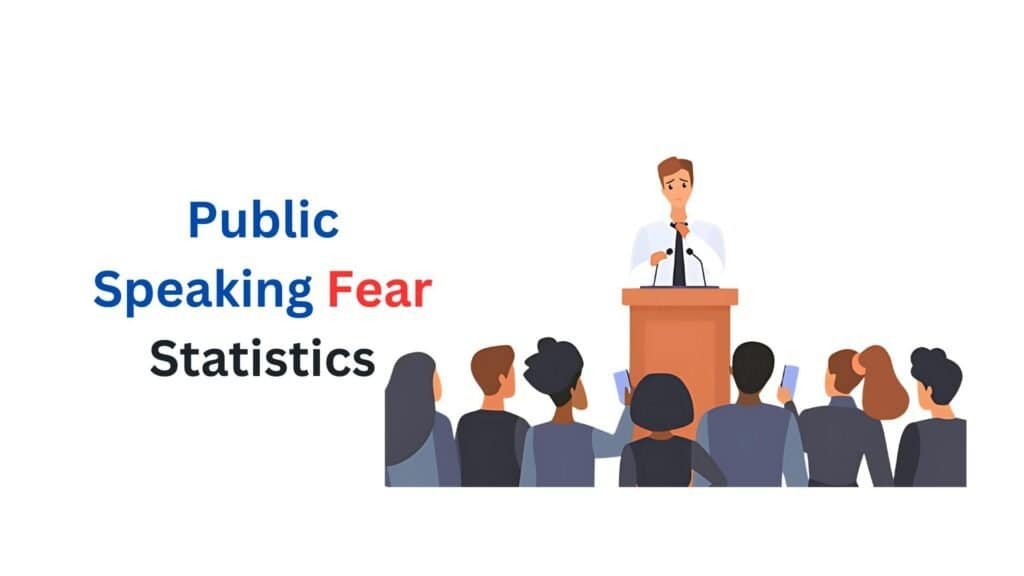Introduction
Public Speaking Fear Statistics: The fear of speaking in front of others can hold us back both in school and at work. Almost everyone has to give an oral report in school, and most college degrees require at least one public speaking class. Being good at speaking in front of others is linked to leadership skills. Strong public speaking skills can make a big difference in how well you do in school and at work. In school, being able to speak well helps you present your research, join discussions, and work with others.
At work, it’s important for meetings, presentations, and networking. Many careers look for these skills, and often, the best leaders are those who can speak confidently and clearly. If speaking in public makes you nervous, practicing often, getting feedback, and gradually challenging yourself can help. With time and effort, you can become more comfortable and effective at speaking in different situations. We shall shed more light on Public Speaking Fear Statistics through this article.
Editor’s Choice
- Research shows that in public speaking, 55% of communication is non-verbal (like body language), 38% is vocal (tone and volume), and only 7% comes from the actual words used. This means how you present yourself and your voice are more important than just the words you say.
- For 46% of people, making a compelling story is the hardest part of preparing a speech, which shows that good storytelling is essential.
- The fear of public speaking is one of the top three fears in the US, along with fear of death and financial issues. About 75% of people have this fear, showing how widespread it is.
- In 2020, around 40 million people were diagnosed with this fear of public speaking, highlighting how common it is.
- Up to 92% of people think that having great presentation skills is important for job success, stressing the value of being good at public speaking.
- As stated by Public Speaking Fear Statistics, fear of public speaking can reduce wages by 10% and lower the chances of getting promoted by 15%, affecting career growth.
- About 45% of people have either turned down a promotion or avoided applying for jobs because of their fear of public speaking, showing its impact on job decisions.
General Public Speaking Fear Statistics
- Glossophobia, or the fear of public speaking, is the most common phobia, affecting about 75% of people.
- This fear is more common than the fear of death, spiders, or heights.
- Around 5-10% of people have severe Glossophobia, while about 25% have a moderate fear of speaking in Public.
- Public Speaking Fear Statistics stated that women are more likely to experience this anxiety than men.
- Fear of public speaking often starts during teenage years and can continue into adulthood unless addressed.
| Statistics | Value |
| Average Number of Audience Members |
50-100 |
|
Average Speaking Rate |
125-150 words per minute |
| Average Length of Speech |
15 minutes |
|
Percentage of people who get nervous speaking in Public |
75% |
| Average time spent in preparing the speech |
17.5 hours |
- It can hurt career opportunities and advancement, with roughly 20% of people with this fear avoiding careers that involve frequent presentations or public speaking.
- Symptoms of public speaking anxiety can include trembling, sweating, a racing heartbeat, and shortness of breath.
- About 40% of people with this anxiety experience sleep problems before speaking engagements.
- Public Speaking Fear Statistics stated that up to 15% of college students report a significant fear of public speaking, and around 73% of business professionals struggle with it.
- Both new and experienced speakers can be affected.
- This fear often leads to avoiding speaking opportunities or making excuses to skip presentations. It can also lower self-esteem and self-confidence.
Glossophobia and Social Phobia
- Glossophobia, or the fear of speaking in Public, is quite common.
- Experts believe that about 77% of people have some level of anxiety when it comes to public speaking. For many, being the centre of attention and talking in front of others can be very uncomfortable and stressful.
- If your fear is strong enough to cause issues at work, school, or in social situations, you might have a serious phobia.
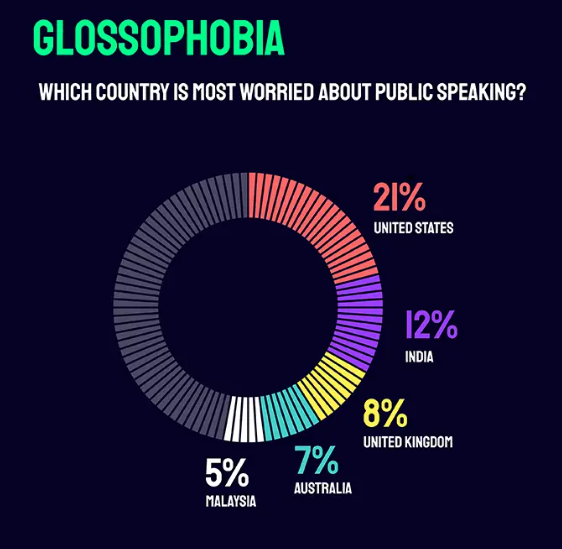
- Since public speaking is often encountered in daily life, this fear can be very limiting, so much so that even simple tasks like ordering a coffee can feel daunting.
- Overcoming this fear usually requires a lot of practice and experience, but many people can learn to handle it better, as stated by Public Speaking Fear Statistics.
- You might feel uncomfortable speaking on camera, but you can still become more at ease in social and professional situations where you need to speak.
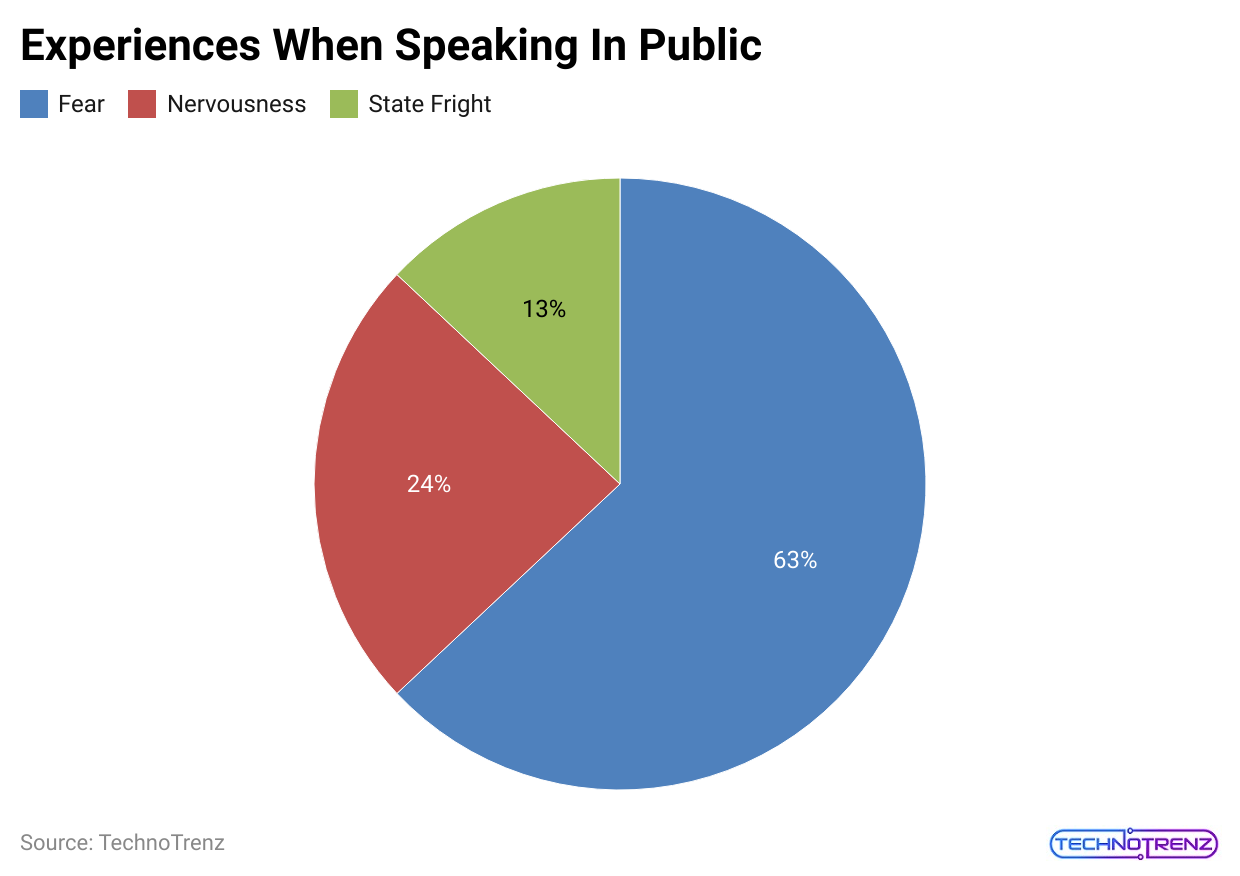
- Glossophobia is a type of social anxiety, specifically about public speaking. Most people with this fear don’t have other social anxieties, like meeting new people or performing tasks in front of others.
- Many people with Glossophobia can dance or sing on stage as long as they don’t have to speak. However, stage fright is still common among those with this fear.
- Public Speaking Fear Statistics stated that Glossophobia can also happen in smaller settings. For example, a child might be nervous about being called on to answer a question in class.
- This fear can lead to avoiding situations where you might be the focus of attention, which can have a big impact on your life.
Impact of Public Speaking Fear On the Individual
- Higher Stress and Anxiety: Those who fear public speaking often feel more stressed and anxious.
- Career Setbacks: This fear can cause people to avoid opportunities for job advancement. About 25% of people say it affects their career growth.
- Impact on School: Students with this fear may need to do better academically.
- Avoidance: Around 15% of people completely avoid situations where they have to speak in Public.
- Starts Early: This fear often begins in the teenage years and can continue into adulthood.
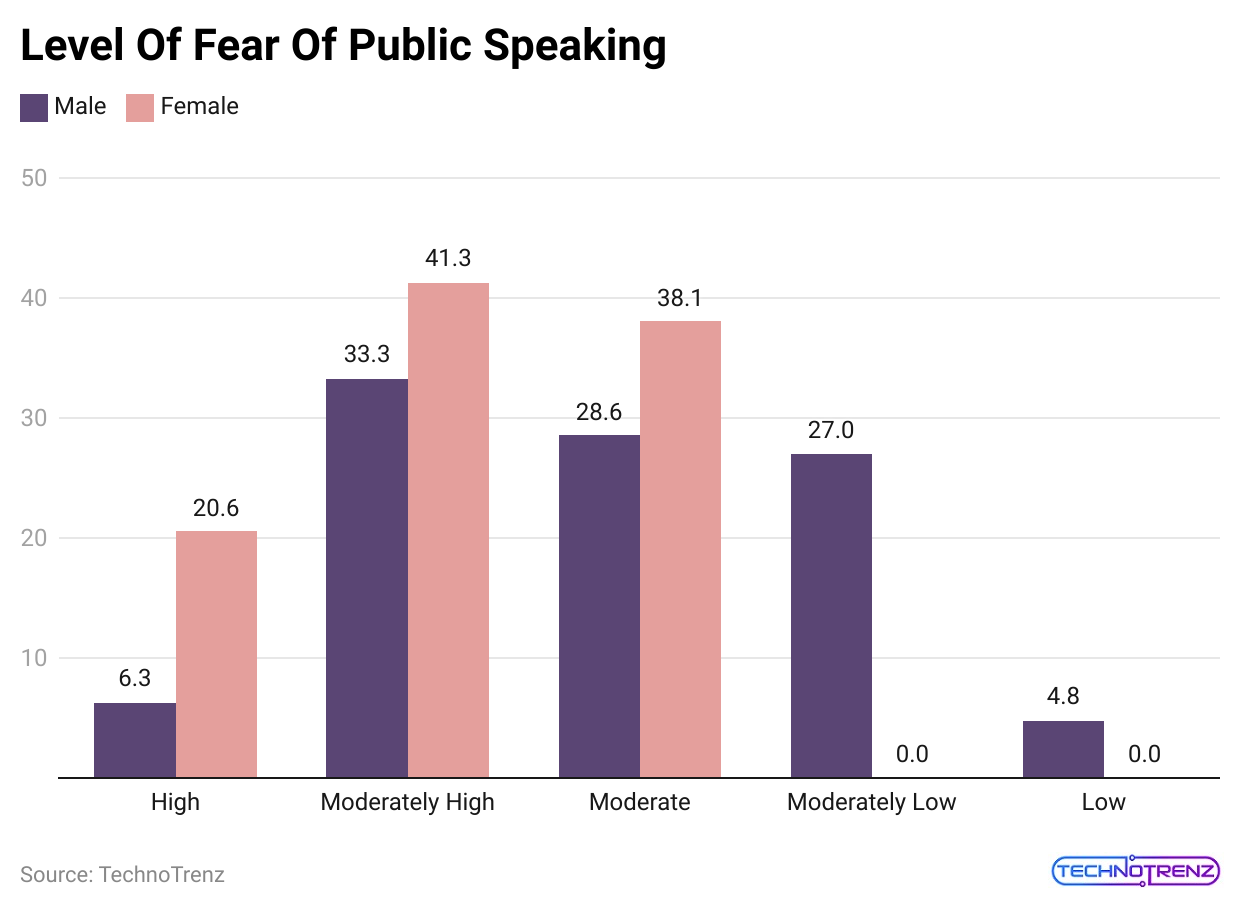
- Physical Symptoms: It can cause physical signs like sweating and shaking.
- Fear of Judgment: This anxiety is often tied to a fear of being judged or embarrassed.
- Panic Symptoms: Some people with this fear may also have symptoms of panic disorder.
- Avoiding Situations: This fear can make people avoid social and work situations where they need to speak.
- Glossophobia: The technical name for this fear is Glossophobia.
- Lower Self-Esteem: Public speaking anxiety can reduce self-confidence and self-esteem.
- Origins: This fear may come from childhood experiences or cultural factors.
- Performance Anxiety: People might also struggle with anxiety in other areas of their lives.
- Missed Opportunities: Fear of public speaking can lead to missed chances for personal and professional growth.
- Fear of Failure: This fear is often rooted in worrying about failing or making mistakes in front of others.
Reasons for Public Speaking Fear Statistics
Many people, especially at work, feel nervous about speaking in front of others. Even experienced speakers can get anxious. For some, this fear can be so strong that it affects their everyday life, making it hard to interact at work, school, or social events.
The top Public speaking fears are:
- Forgetting Words (36%): The biggest worry is forgetting parts of the speech, which can cause awkward pauses or disrupt the presentation.
- Freezing Up (33%): Another common fear is becoming so nervous that they can’t speak or continue with their presentation.
- Looking Foolish (33%): Many people fear appearing incompetent or silly in front of others, which can lead to worries about embarrassment.
| Rank | Reason | Percentage |
| 1 | Forgetting Words |
36% |
|
2 |
Freezing Up | 33% |
| 3 | Looking foolish |
33% |
|
4 |
Fear of being judged | 32% |
| 5 | Losing train of thought |
28% |
|
6 |
Saying “em” too many times | 28% |
| 7 | Not meeting expectations |
22% |
|
8 |
Audience boredom or disinterest | 22% |
| 9 | Physical symptoms being visible (eg, shaking, sweating) |
22% |
|
10 |
Stuttering |
21% |
Perception and Attitudes Towards Public Speaking
- 45% think public speaking skills are key to professional success.
- 35% of professionals find public speaking the most intimidating aspect of business.
- Public Speaking Fear Statistics stated that almost 68% of event planners view public speaking as the most powerful marketing tool.
- 64% of Americans fear public speaking more than other common phobias.
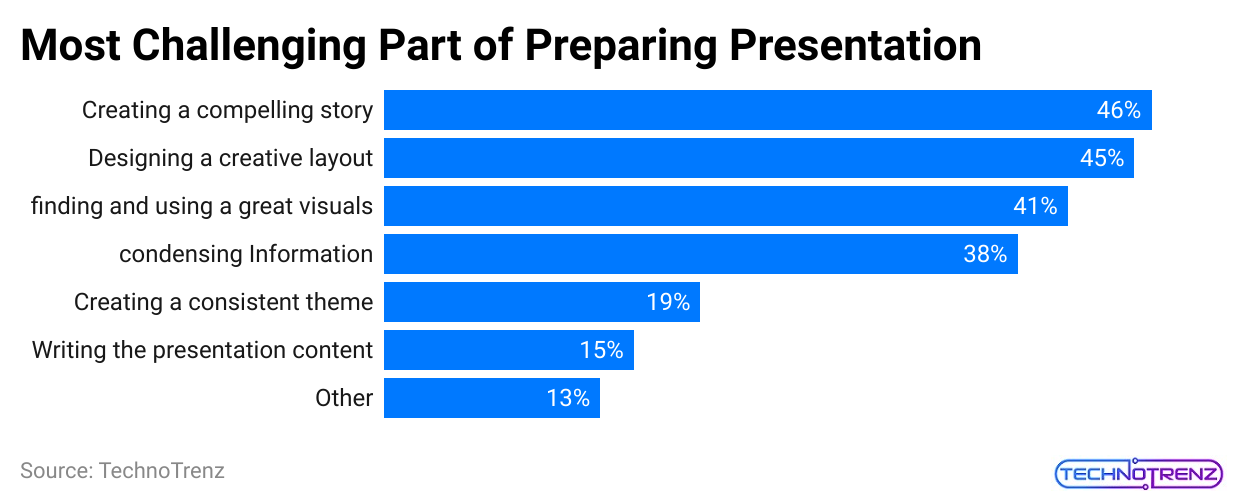
- 82% of professionals believe tone is crucial for effective communication
- Public speaking is the number one fear for 74% of people, even more feared than death for about 73% of individuals.
- 70% of employers value public speaking skills more than technical skills.
- 93% of communication effectiveness comes from nonverbal cues.
- 75% of Americans see confident public speakers as more trustworthy.
- 68% of people think that those who speak confidently are seen as more intelligent.
- Public Speaking Fear Statistics stated that only 7% of people feel very confident in their public speaking abilities.
- Less than 20% of professionals believe they are very good at presentations.
- 60% of people think public speaking boosts their credibility.
- Public speaking is considered more stressful than visiting the dentist by 15% of the population.
- 70% of employed Americans believe presentation skills are crucial for job success.
- Public Speaking Fear Statistics stated that 58% think public speaking is essential for future careers.
- 85% agree that being confident in public speaking is important for career advancement.
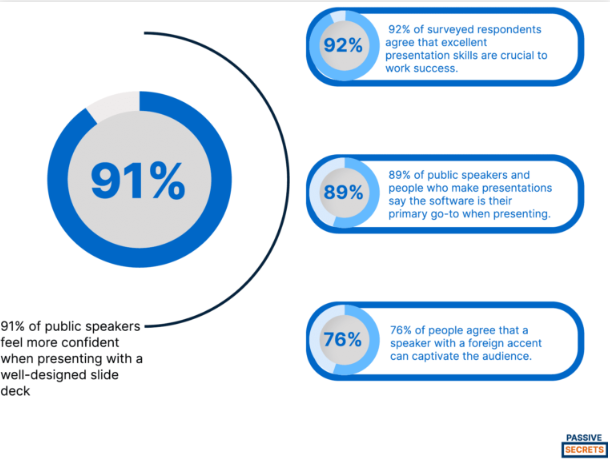
- 77% of professionals believe public speaking is vital for career development.
- 25% of individuals are comfortable with video conference calls.
- 91% of workers see communication skills as essential for work performance.
- Public Speaking Fear Statistics stated that almost 82% of people feel nervous about speaking in Public.
- Only 12% of people feel completely relaxed when speaking in front of an audience.
Impact of Education and Age on Public Speaking Fear Statistics
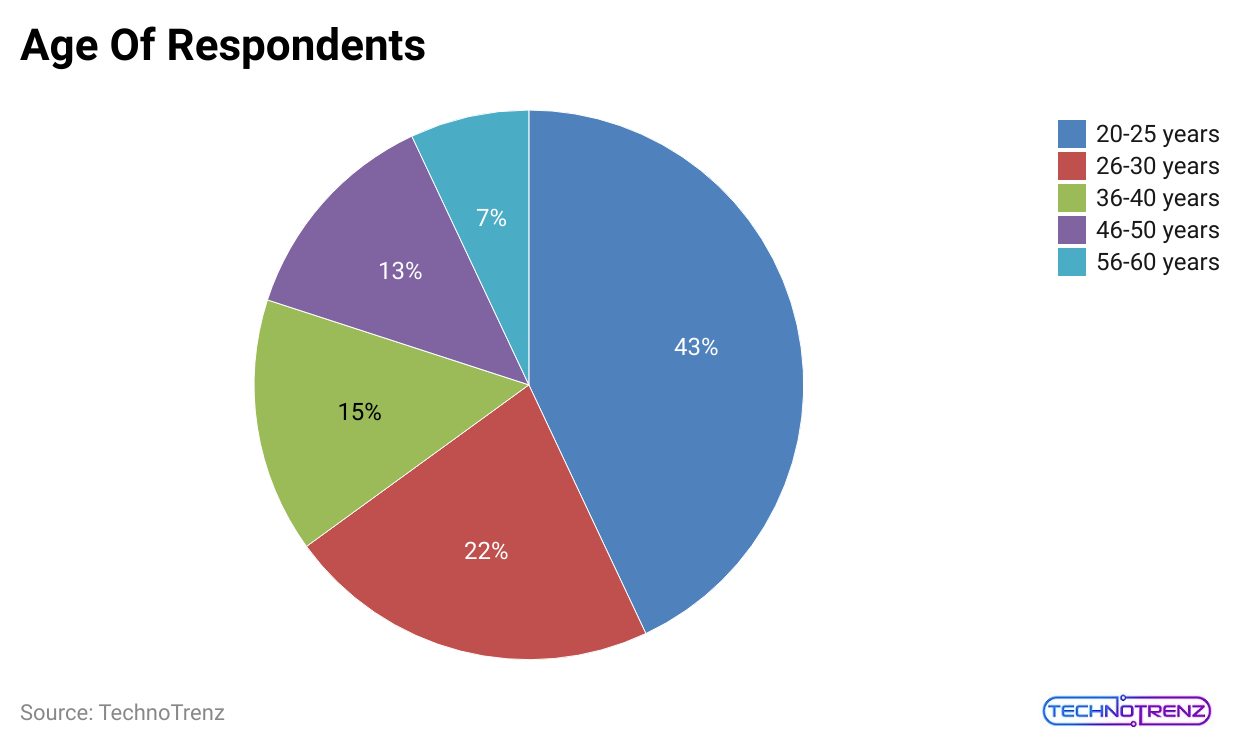
- In the above chart, we can see the demographic statistics of public speaking fear per age group:
| Age | Percentage |
| 20-25 years |
43% |
|
26-30 years |
22% |
| 36-40 years |
15% |
|
46-50 years |
13% |
| 56-60 years |
7% |
- High School Students: Around 75% of high school students feel nervous when speaking in front of others.
- College Students: Up to 95% of college students feel anxious about public speaking.
- Graduate Students: Many graduate students also have public speaking anxiety, especially when presenting their research or defending their thesis. Research shows that up to 40% of them feel moderate to severe anxiety.
- Working Professionals: Public speaking fear is also common among working professionals, with up to 73% experiencing anxiety about speaking in Public.
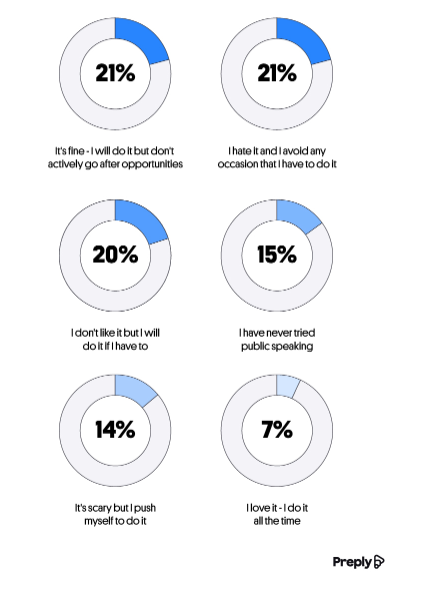
Gen Z:
- About 63% of people aged 16 to 24 would avoid public speaking if they didn’t have to.
- Only 11% of Gen Z enjoy it and do it regularly.
- This shows that even though we are always communicating online, many young people avoid speaking opportunities because they are afraid, which could lead them to miss important chances for personal and career growth.
General Population:
- The fear of public speaking affects more than just young people.
- Around 21% of people of all ages say they avoid situations where they have to speak in front of others.
- Public Speaking Fear Statistics stated that the fear is strongest among those aged 45 to 54, with over 28% in this group saying they hate and avoid public speaking.
- Millennials are the most likely to enjoy public speaking, with 13% of them liking it.
Overall Trends:
- Public speaking anxiety is a common issue for people of all ages.
- Even though many people are afraid, 35% of those surveyed will still push themselves to speak in Public despite finding it scary.
- This suggests that more support and practice opportunities are needed to help people improve their public speaking skills and overcome their fears.
Job Interview and Public Speaking Fear Statistics
- Job interviews are a key chance to showcase your skills, so being confident is important. However, many people find job interviews to be the most stressful public speaking situation.
- Surveys show that public speaking anxiety is highest in work-related settings.
- To succeed in your career, it’s crucial to be able to speak confidently and engage your audience.
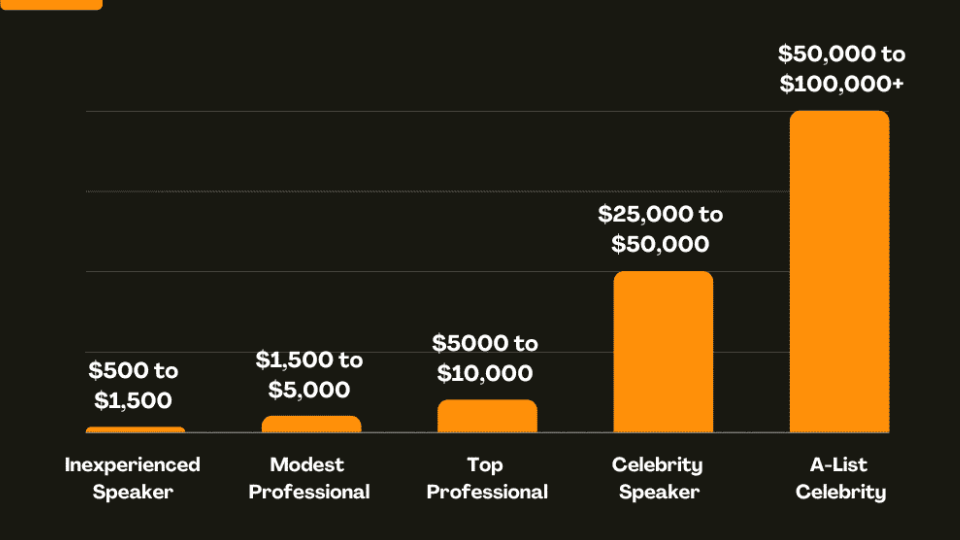
Here are the top situations where people feel the most public speaking anxiety, including both work and personal events:
- Job Interviews (32%): These are the most stressful because the pressure to make a good impression is very high. You need to highlight your skills and fit for the job while being judged by potential employers.
- Presenting in Public (25%): This is the second most stressful situation, where the challenge is speaking alone in front of an audience. It involves keeping the audience engaged, delivering your message effectively, and handling your nerves.
- Work Presentations (22%): These are the third most stressful, combining the need to present professional content with the pressure of workplace expectations and dynamics.
| Rank | Settings | Percentage |
| 1 | Job Interview |
32% |
|
2 |
Presenting in Public | 25% |
| 3 | Work Presentations |
22% |
|
4 |
Speeches | 22% |
| 5 | Performing in front of others |
21% |
|
6 |
Talking to Authority figures | 14% |
| 7 | Workplace meetings |
13% |
|
8 |
Participating in Group Discussions | 12% |
| 9 | Wedding Speeches |
12% |
|
10 |
Dating | 8% |
Fear of Public Speaking Prevalence
- About 74% of people feel anxious when speaking in Public.
- Only 10% of these people get treatment for their fear.
- Public Speaking Fear Statistics stated that public speaking anxiety affects people of all ages and genders.
- This fear can impact anyone, from teachers to CEOs.
- Around 45% of those with this fear think it hinders their career progress.
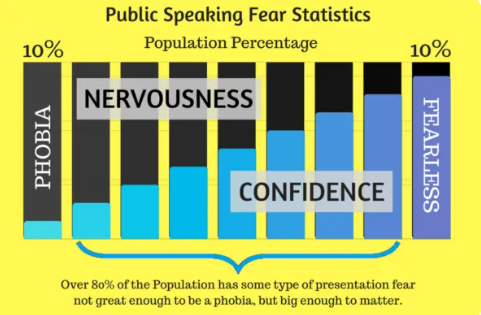
- The fear can come from past negative experiences or social influences and often includes negative self-talk and irrational thoughts.
- More than 90% of successful public speakers have experienced this anxiety at some point.
- About 85% of people feel nervous before speaking in Public.
- This anxiety can be managed and overcome with the right techniques and therapy.
- Good public speaking training can greatly reduce anxiety, as stated by Public Speaking Fear Statistics.
- Cognitive-behavioral therapy (CBT) and virtual reality exposure therapy are effective in helping reduce Public speaking anxiety.
- This fear can be learned by watching others have negative experiences with speaking.
- The fear can occur not only in large groups but also in small groups or one-on-one situations.
- Public Speaking Fear Statistics stated that around 75% of people with this anxiety worry about being judged or criticized.
- Many fear forgetting their speech or having their mind go blank.
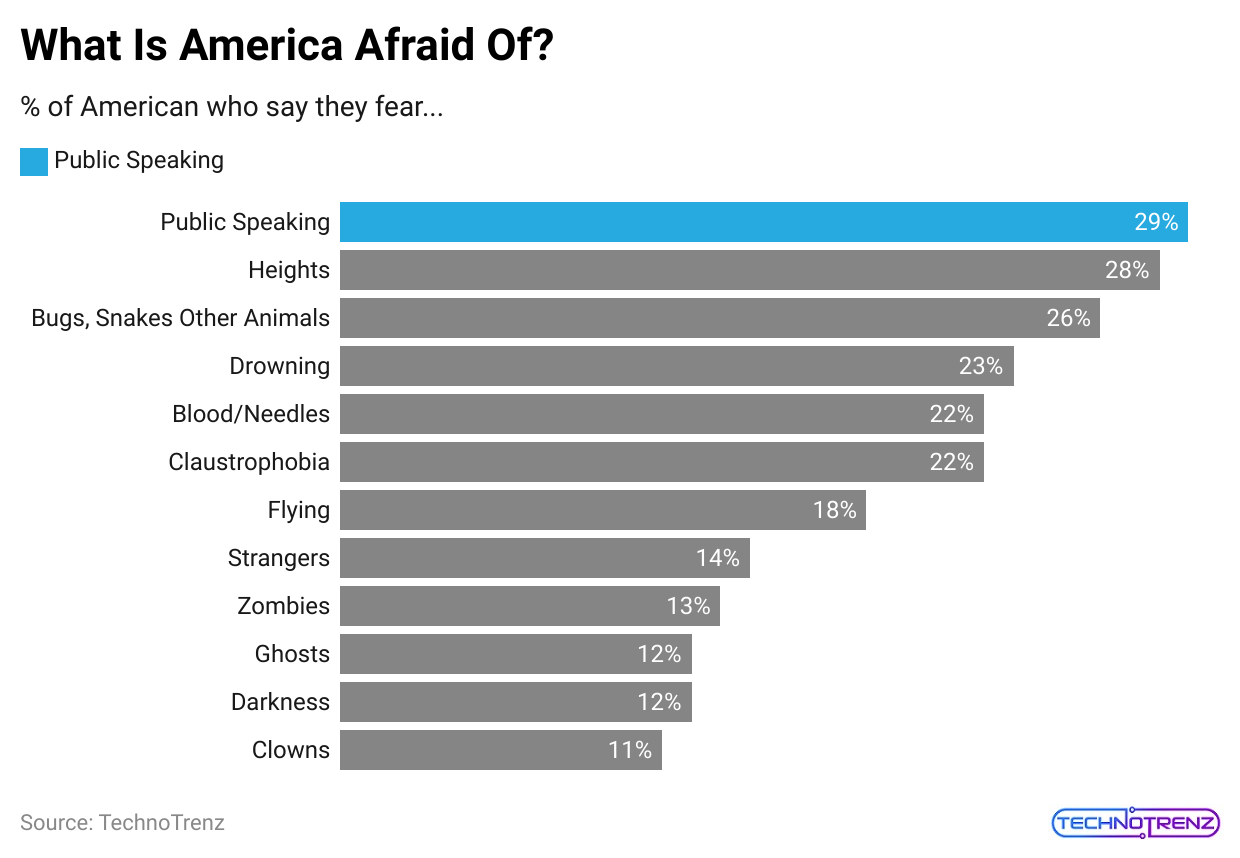
- This fear can lead to missed chances for both personal and professional growth.
- High pressure, time constraints, and a lack of preparation can make the fear worse.
- About 30% of people with this anxiety also show signs of depression.
- Public Speaking Fear Statistics stated that students may avoid giving presentations or participating in class due to this fear.
- Some people use alcohol or other substances to cope with their anxiety.
- The fear of public speaking can sometimes run in families, suggesting a genetic link.
- About 50% of those with Public speaking anxiety seek professional help to overcome their fear.
Conclusion
Getting over the fear of public speaking involves understanding why you’re scared, recognizing how it affects you physically, and using effective methods to handle it. This skill is important for personal growth and crucial in many professional fields, like consulting. Accepting that feeling a bit nervous is normal, and using that nervousness positively can improve your Public speaking.
Remember, being nervous isn’t a problem; it’s a natural response that can help you give strong and confident speeches. Whether you’re a student, a business leader, or a consultant, becoming good at public speaking is a goal you can achieve, and it can lead to many new opportunities.
So, take a deep breath, prepare well, and go into your speech with confidence. We have shed more light on Public Speaking Fear Statistics” through this article.
Sources
- Crossrivertherapy
- Supportivecareaba
- Blogs
- Ncbi
- Verywellmind
- Nationalsocialanxietycenter
- Wifitalents
- Performzen
- Worldmetrics
- Passivesecrets
- Totalcareaba
- Gitnux
- Magneticspeaking
- Healthcentral
- Magiecook
- Managementconsulted
- Corporatecommunicationexperts
- Preply
- Ambitionsaba
- Zipdo
- Ethos3
- Gitnux
- Speaking
- Osmosis
- Wikipedia
- Jobera
- Weshare
- Worldmetrics



